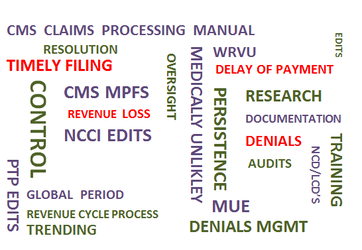Coding and Regulatory Terms
|
APR DRG
Claims On Hold
Case Mix Index (CMI)
Discharged Not Final Billed (DNFB)
Denials
Edits
Facility Fee Coding
Healthcare Common Procedure Codes (HCPCS)
Medical Necessity Medicare Severity Diagnosis Related Groups (MS-DRGs)
Non Physician Providers (NPP's)
Professional Fees
Provider Relative Value Unit (RVU)
Timely Filing Deadline |
All Patients Refined Diagnosis Related Groups (APR DRG) serve as an all payer alternative to the Medicare Severity Diagnosis Related Groups (MS-DRGs used by Medicare. APR DRGs is a classification system that classifies patients according to their reason of admission, severity of illness and risk of mortality.
Claims on hold represent billing for accounts for which coding has been completed but they are on hold for some reason. This is generally tied to errant or missing charges, edits based on payer rules. The case mix index is the average DRG relative weights for all Medicare admissions. Discharged Not Final Billed is an accounting of all accounts held for billing for some reason. This could be related to late or errant charges, missing information necessary for billing, unresolved edits, etc. These accounts are unbilled. An account has been submitted to the payer and the account, or a portion of the account is denied. These denials may be related to missing information, incorrect coding, services that cannot be billed together, lack of medical necessity, etc. Logic within the Standard Claims Processing System (or PSC Supplemental Edit Software) that selects certain claims, evaluates or compares information on the selected claims or other accessible source, and depending on the evaluation, takes action on the claims, such as pay in full, pay in part, or suspend for manual review. Reference: CMS.Gov Glossary Facility fees are those fees that are assigned on the behalf of the facility itself. Facility fees are assigned for medical and surgical services performed by the physicians and other Nonphysician providers (NPP), however this fee is applied in consideration of the facility as a site of service, the clinical staff members working in support of the provider, the supplies, equipment etc. These staff members include nurses and other staff members. The fee is not paid on the actual work of the provider themselves. HCPCS are codes are used to identify services, supplies and products which are not included in CPT coding. These codes are applied to services not provided by a physician, but could be performed by ambulance services and other entities. For every service provided medical necessity must be present. That means the submitted diagnosis must be an appropriate reason of provision of any ancillary, medical and/or surgical service. Medicare Severity Diagnosis Related Groups (MS-DRGs) MS DRG’s are specific to Medicare and Medicare Advantage claims. This is a severity diagnosis related group classification system which is used to calculate payment for inpatient hospitals claims. This classification system is used to covered acute care hospitals and critical access hospitals. A NPP includes clinicians who are not physicians. These individuals may be Physician Assistants (PA), Nurse Practitioners (NP) and/or Clinical Nurse Specialists (CNS). Professional fees are those fees assigned on behalf of physicians and nonphysician providers. Many staff members including coders mistakenly assume professional fees are limited to evaluation and management services and this is incorrect. Surgical and medical services are also included when coding and billing for professional fees. The reimbursement is restricted to the work of each individual provider as for each individual date of service. Professional fees are never assigned for a range of dates. Professional fees may be assigned for physicians and NPP’s who are employed by hospitals and provide their professional services on site. They may also be submitted for services provided in an independent physician office. Other sites of services include, nursing home, ambulatory surgery centers, urgent care centers, etc In writing for reimbursement many staff members use the term provider instead of the more formal statement of “physician and non-physician providers (NPP’s)”. This is not something physicians seem to view positively. However, the Medicare definition of “provider” includes the site of service including, but not limited to hospital, skilled nursing facility, home health agency, outpatient physical therapy, comprehensive outpatient rehabilitation facility, end-stage renal disease facility, hospice, physician, non-physician provider, laboratory, supplier, etc.) providing medical services covered under Medicare Part B.” Medicare further defines provider as any organization, institution, or individual that provides health care services to Medicare beneficiaries. Physicians, ambulatory surgical centers, and outpatient clinics are some of the providers of services covered under Medicare Part B. A relative value unit (RVU) is a term used to describe formulas produced by Medicare for reimbursement for provider services. Most payers have a deadline during which claims (bills) for encounters must be submitted. When accounts are held up for any reason and that deadline cannot be met, they have exceeded the “timely filing deadline” and all revenue for the services and procedures is lost. This deadline is in respect the Date of Service (DOS). For example, per Medicare guidelines, a claim must be filed with the appropriate Medicare claims processing contractor no later than 12 months after the DOS. Some payers, including Medicare have exceptions to this rule. |

